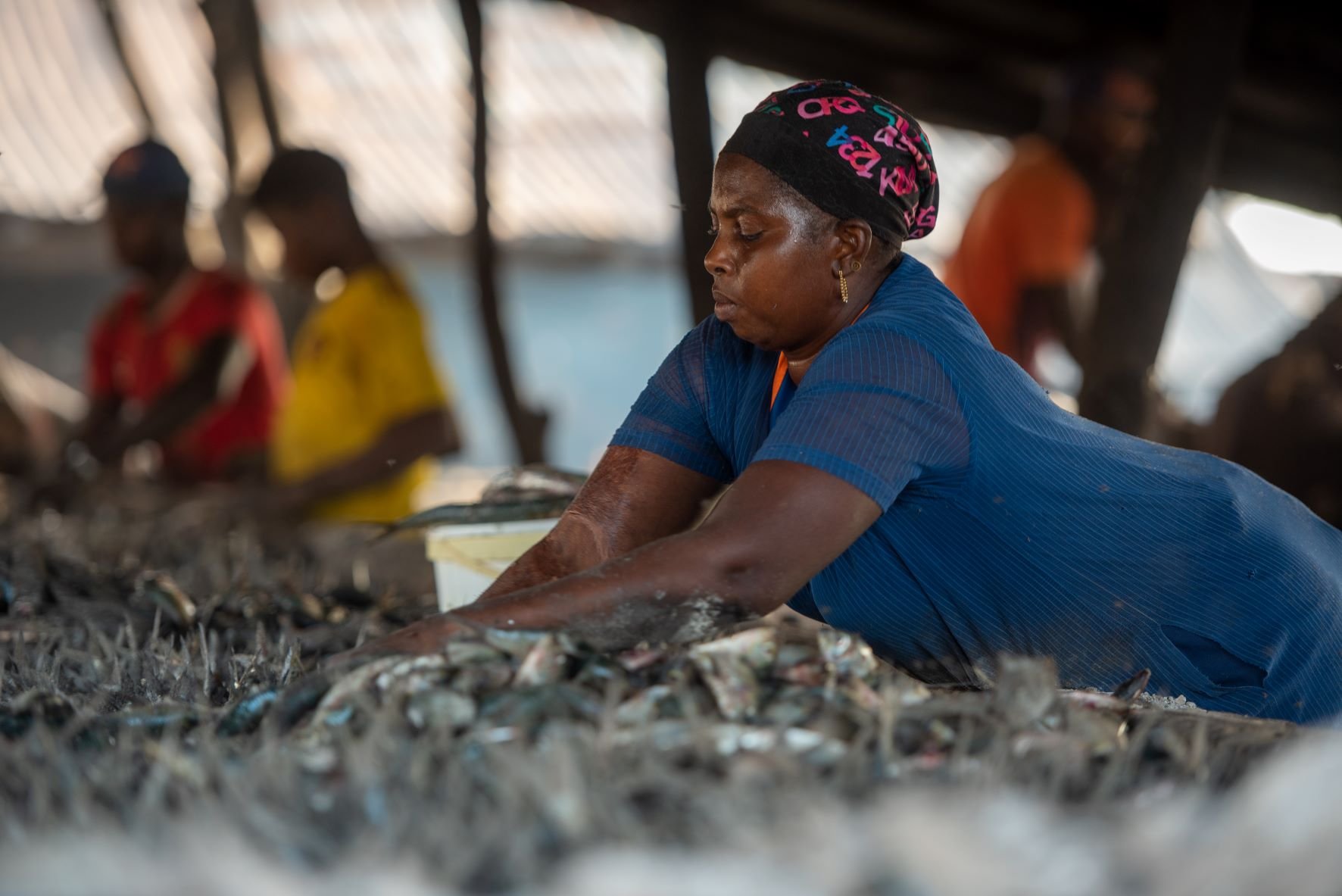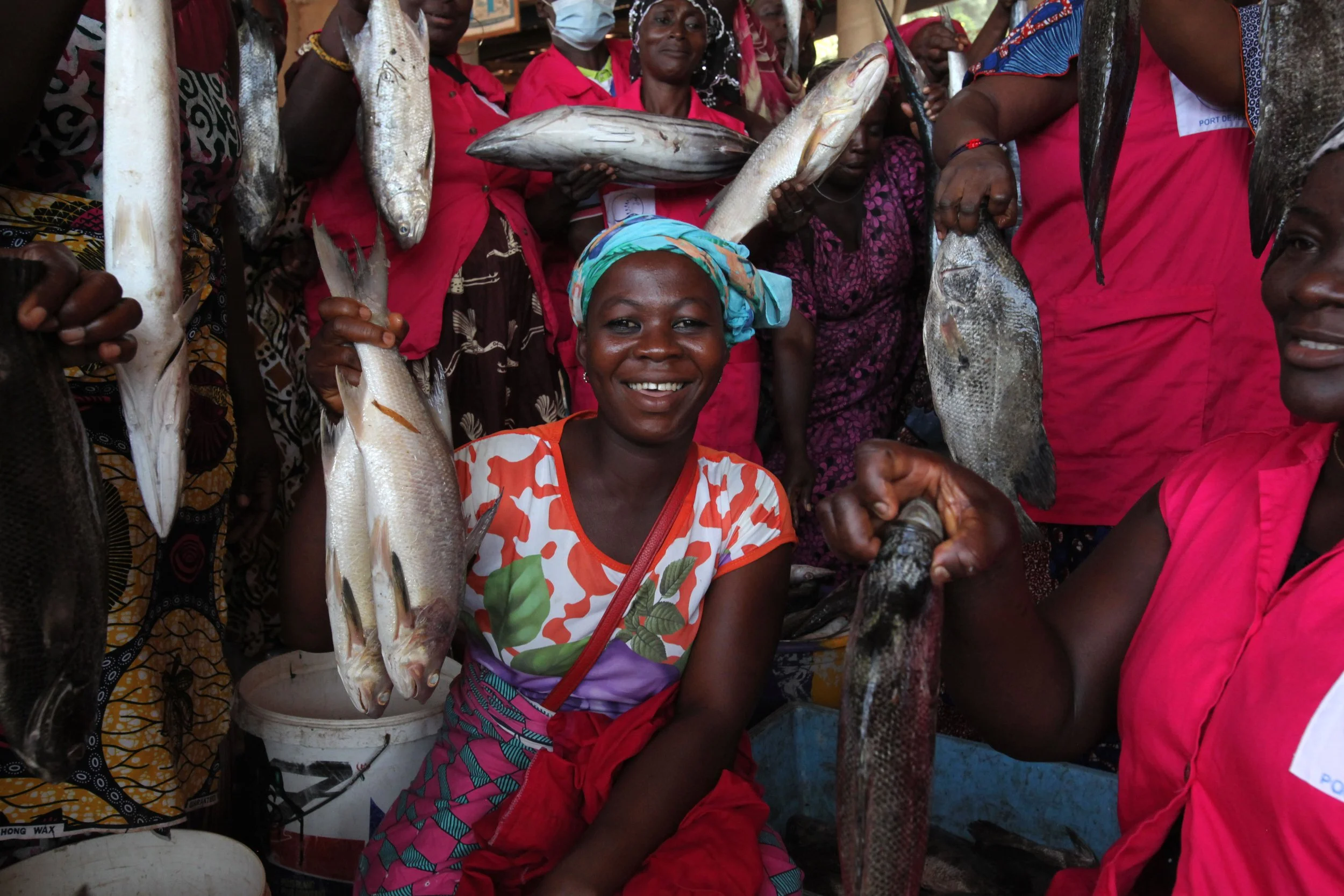Women in African artisanal fisheries are adamant that no crisis in their lifetime has affected their activities as deeply as the Covid-19 crisis.
In a statement issued by the African Confederation of Artisanal Fisheries Organisations (CAOPA) on the occasion of International Women's Day on 8 March, they highlight the challenges they face in obtaining supplies from fishermen, and the difficulties they face in continuing to process and market their products.
Indeed, the measures taken by African governments to counter the Covid-19 epidemic this past year - curfews, lockdowns and border closures - have had a damaging impact on their activities. They emphasise that, thanks to them, people have continued to have access to fish, a source of animal protein, micronutrients and fatty acids: "This crisis has shown the irreplaceable role of African artisanal fisheries, and the women who work in the sector, for food security."
Since the beginning of the pandemic, CAOPA has been calling for governments to respond to this crisis to improve the working conditions of women and men in artisanal fisheries as they are "essential workers". For the women of CAOPA, improving their working conditions must be a priority, as they operate in unhealthy conditions, often for a meagre income. They also demand that their governments protect artisanal fishing areas and landing sites "from predation" by other economic sectors in the coastal zone.

Working in smoke, more than 50% of women fish processors have respiratory problems. Photo: Mamadou Aliou Diallo.
For these women, the FAO guidelines for sustainable small-scale fisheries are an essential guide, which can be complemented with the "experience, innovation, commitment and strength of women in fisheries."
They conclude their statement firmly: "Ensuring decent living and working conditions for women in artisanal fisheries is more necessary than ever to avoid food crises and to ensure the stability of coastal communities in Africa."
Banner photo: Screenshot of CAOPA video. Mamadou Aliou Diallo/REJOPRA.
JOINT LETTER: 11 African artisanal fisheries organisations and development NGOs send a letter to Commissioners Virginius Sinkevicius and Jutta Urpilainen asking them to use the crucial voice of the EU through Sustainable Fisheries Partnership Agreements and the EU-Africa partnership to address the impending food crisis in the West African region linked to the fishmeal and fishoil production.
The Sub-Committee responsible for providing recommendations to the FAO Committee on Fisheries (COFI) on the technical and economic aspects of the international fish trade is meeting in Bergen (Norway) this week. We take a look at what's at stake for small-scale fisheries in Africa.
The annual UN General Assembly Resolution on Sustainable Fisheries usually comes out at the end of the year. This article analyses, how, at the end of the International Year of Artisanal Fisheries (IYAFA), the text reflects the key issues for this sector.
2022, the International Year of Artisanal Fisheries and Aquaculture (IYAFA), has been a pivotal year for small-scale fisheries, meeting the UN’s goal of raising awareness about the role they play in employment, food security, nutrition, livelihoods, culture, and coastal communities well-being. Beyond recognition, there is an urgent need for concrete action in securing their access to marine resources and markets, as promised by States under Sustainable Development Goal 14.b.
JOINT PRESS RELEASE: Small-scale fisheries are small in name only. Half a billion people – 7% of the global population – are at least partly dependent on them for food, employment and income. They are the largest group of ocean users, have contributed the least to the ocean emergency, and are among the most affected by it. Yet their needs, roles and rights are often ignored, and they are generally sidelined or excluded from major policy discussions that directly affect their lives and livelihoods.
To improve food security and reduce poverty, it is imperative to address the challenges women in the sector face: health issues and poor working conditions linked to the smoking ovens and the difficulties for accessing energy for their activities and the preservation of raw materials.
The new EU regional programming for Africa gives fisheries and oceans greater importance. It also focuses more on small-scale fisheries stakeholders and civil society organisations, which is an opportunity for them to make their voice heard. This article covers a summary of the 2014-2020 and the ongoing 2021-2027 programming, calls for more policy coherence and recommends increased participation of stakeholders for greater and efficient use of the EU funding.
In view of the summit that will bring together the leaders of the European Union and the African Union in Brussels on 17th and 18th February 2022 and in the context of the International Year of Artisanal Fisheries and Aquaculture (IYAFA), six civil society and professional organisations call the EU and AU to take concrete action in three key areas. Click on the link to read more.
The year 2022 is shaping up to be a pivotal year following its designation as the International Year of Small-scale Fisheries and Aquaculture. This article outlines our major concerns and recommendations at the end of this year.











West Africa has pioneered several decades of artisanal fisheries management reform. Yet there are still major obstacles to co-management: a lack of political will reflected in low budgetary allocations; inadequate and poorly targeted support for fisher organizations; poorly defined roles and responsibilities of fishers in co-management; lack of enforcement of inshore exclusive zones; and inadequate defense of human rights and particularly the important role of women.